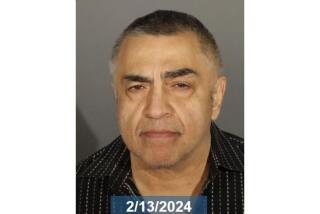Witness says recording is of ‘El Chapo’ agreeing to a major drug deal with Colombian rebel
Reporting from New York — After weeks of accusation and innuendo, prosecutors in the trial of Mexican drug kingpin Joaquin “El Chapo” Guzman on Thursday unveiled their most damning evidence yet — a cocaine negotiation allegedly between the defendant and a Colombian guerrilla that authorities were able to intercept because of a simple administrative mistake.
For want of a software license, the government’s latest cooperating witness testified, the narco-empire was lost.
“No. 1 , the engineer is an irresponsible person,” griped Jorge Cifuentes, a midlevel Colombian narco who helped organize the six-ton cocaine deal that a person identified as Guzman could be heard negotiating with a member of the Revolutionary Armed Forces of Colombia, or FARC, in a call played for jurors on Thursday. “Secondly, the system is down, so none of us can have secure communications anymore.”
The Sinaloa cartel boss and his Colombian associates had invested in sophisticated encryption software, Cifuentes explained to jurors. But the engineer failed to pay for the license, leaving the drug traffickers exposed.
“Four tons will be in properties and we are going to pay cash for two tons,” the voice identified as Guzman’s says on the tape. He also discusses sending his own nephew as collateral, and exacted a promise that his men could check the quality of the cocaine because a previous shipment was not up to snuff.
“He’s a really good businessman, because now he’s saying he’s going to put two [million dollars] and not two and a half,” Cifuentes said of the accused, whom he called “Don Joaquin” throughout his three days of testimony.
Whether it was good for business at the time, the call now stands out as a blow to Guzman’s defense. Previously, Guzman’s lawyers have painted his accusers as polished liars who will say anything to see their sentences reduced or their families relocated to the United States. But the tape indicates that at least some of what other witnesses have told the jury is true. The tape places Guzman at the center of a multimillion-dollar cocaine deal, and illustrates the intimate link between his organization and Colombia’s brutal drug wars.
For witness Cifuentes, who is from Colombia’s former cocaine capital, Medellin, drugs were a family business, he told jurors. He began processing cocaine with his father and older brother when he was just 4, and his family was so poor that he and seven of his siblings slept in the same bed.
At 18, Cifuentes landed in a Colombian prison, where he had an affair with a guard’s wife and tried to endear himself to members of a cartel, agreeing to murder one of their rivals by sprinkling cyanide on his arepa, a traditional cornmeal patty. The murder plan failed, but the business scheme worked, and by his early 20s Cifuentes was moving tons of cocaine and millions of dollars in cash every month.
“You’re a close family, is that correct?” Guzman’s attorney, Jeffrey Lichtman, asked during cross-examination.
“Unfortunately, no,” Cifuentes answered. “We had conflicts like any other — gossip here, gossip there.”
“Like the time your brother Alex ordered the murder of your nephew Jaime?” Lichtman asked.
“Yes, sir,” the witness said.
“Typical family issues,” the attorney quipped, earning him an objection.
The murder contract was payback, Cifuentes explained, after his nephew had tried to kidnap his mother, a woman whose advice the witness frequently sought in his drug deals.
Cifuentes told the court he first met Guzman in 2002 as he was trying to reestablish his drug-trafficking business in Mexico. He hoped the drug boss could arrange a meeting with his longtime partner and purported successor, Ismael “El Mayo” Zambada. Just four years earlier, Zambada had ordered the killing of Cifuentes’ best friend, Umberto Ojeda, who was gunned down at a gas station with his young son in the car.
“I asked him to get me a meeting with Ojeda’s murderer, and obviously that was Mayo Zambada,” Cifuentes testified.
“You were still willing to deal drugs with him?” Lichtman asked.
“Yes, sir,” the witness answered.
But neither a brutal murder nor a cold-blooded business deal could compete with the thrill of the news still to come. Moments after proceedings stopped for the day, Judge Brian Cogan gave jurors an early Christmas present.
“I can’t make any promises,” he warned, before revealing that the trial was moving much faster than expected. Jurors who’d been told they might be held as late as March could now tentatively plan on being free by the end of January.
Sharp is a special correspondent.
More to Read
Sign up for Essential California
The most important California stories and recommendations in your inbox every morning.
You may occasionally receive promotional content from the Los Angeles Times.











